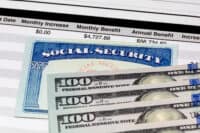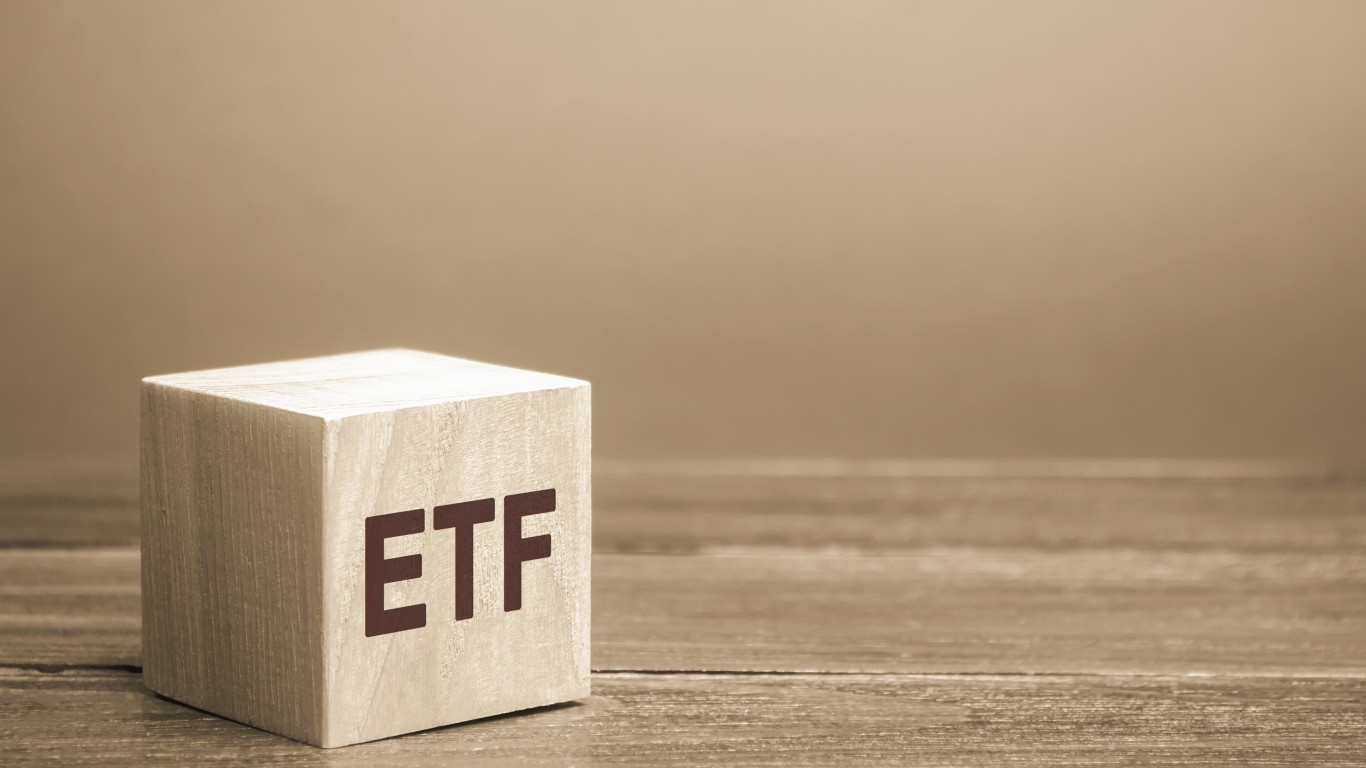
If there is one theme that is taking over and garnering major interest from investors, the ESG theme has to be at the top of the list. While some investors might have called this “do-gooder” investing in the past, the ESG is for companies with strong “environmental” efforts, with “social” responsibility aspects and with strong “governance.” Not all companies with strong ESG ratings might seem as though they would fit into the screens, but exchange-traded funds (ETFs), mutual funds and individually managed accounts are raking in money almost daily that is heading into this theme.
With companies like Apple, Microsoft, Alphabet all having high weightings in the top ESG indexes and ETFs, these were all within about 5% of their consensus analyst price targets. That leaves some investors worried that the stocks either are overvalued or offer little upside versus risk, now that they have performed so well.
24/7 Wall St. ran a screen of the top 50 companies within ESG-themed ETFs and in the top underlying ESG indexes that track the companies in the S&P 500 and other major equity indexes. Our goal was to find companies that were undervalued based on Wall Street analyst expectations, and which also may have even greater upside than the pack of Wall Streeters might be looking for.
Investors need to understand that every management group tends to have its own form of ESG screening. Some managers use a relative ESG score that might allow oil companies and other so-called sin stocks because they are cleaner or better ranked than their peers. Other fund groups may screen out anything tied to fossil fuels, polluting industries and war or other sin sectors.
Of the top 50 stocks within these ESG themes, 15 stocks stood out with above-average upside. Our own base-case scenario for stocks was calling for a return of about 7% for 2020 at the start of 2020. About one-third of that upside was expected to come from dividends.
Some investors have every right to worry that a loose bastardization of the ESG theme has taken place, but that is what sets funds apart from each other. Regardless of which ESG theme you want to target, with billions of dollars flowing in, it has become impossible to ignore the ESG trend.
In the case of each ESG stock for being undervalued, we have shown the Refinitiv consensus analyst target price and offered color that would show the positive case or any concerns that may lower or skew each company’s case for fitting within an ESG investing theme. We also looked for recent analyst reports that are above or below the consensus target prices to keep some balance here.
We have used a total return expectation for an implied upside in 2020, which adds the dividends received on top of an expected gain to the consensus targets. As with all analyst research, investors should never blindly trust reports with upside target prices without doing their own research. And as any investor should expect, there is never any assurance that any analyst target will ever be reached.
The lowest implied upside threshold to be included was 8%, but many of these have expected total return expectations well over 10%. Here are 15 top stocks in the ESG universe that appear to be undervalued against the performance of the S&P 500 and Dow Jones industrials over 2020 and into 2021.
AbbVie: 11.9% Implied Upside
AbbVie Inc. (NYSE: ABBV) has seen its shares skyrocket in the past six months as if concerns about Humira never existed. Trading at $94.50, it has a consensus target price of $101.00, which gives an implied upside of 6.9%, before factoring in the 5% dividend yield. The 52-week high of $97.86 may be just over $3.00 above the current share price, but AbbVie was very briefly above $120 a share back in early 2018.
AbbVie would have even more implied upside if it weren’t for the recent pop in the stock. Mizuho’s new Buy rating from February 6 came with only a $96 target price, but the firm raised that target up to $104 several days later.
Amgen: 13.1% Implied Upside
Amgen Inc. (NASDAQ: AMGN) is the top biotech with a $131 billion market cap, and its $223.05 share price and the $246.05 target would give an implied upside of 10.3%, before factoring in a 2.8% dividend yield. Amgen just hit an all-time high of $244.99 back in December, and its shares were actually negative so far in 2020. SunTrust Robinson Humphrey is more positive than the herd with its $265 target price, and in January Citigroup took its target up to $275.
Booking: 7.8% Implied Upside
Booking Holdings Inc. (NASDAQ: BKNG) had more implied upside than rival Expedia, but that is also after its rival saw a large post-earnings gain. Booking shares recently traded at $1,971.50, and the $2,124.64 consensus target price left an implied upside of about 7.8%. There is no dividend here, but the $82.5 billion market cap is impressive, considering its recent high of almost $2,100 that was resistance last September and this January. Analysts issuing recent upside targets were SunTrust Robinson Humphrey at $2,350 and UBS at $2,200.
Bristol-Myers Squibb: 14.6% Implied Upside
Bristol-Myers Squibb Co. (NYSE: BMY) was last seen at $65.60 per share, and its consensus target price of $73.40 leaves an implied upside of 11.9%, before factoring in its 2.7% dividend yield. That target is above its 52-week high of $68.34. Bristol-Myers was raised to Buy from Hold at Argus late in 2019, and the firm launched an $80 target price at that time.
Coca-Cola: 9.1% Implied Upside
Coca-Cola Co. (NYSE: KO) has moved well beyond the namesake Coca-Cola sugar-water beverages into water, sports drinks and other beverages. Compared with a share price of $59.60, the $63.50 consensus target price gives implied upside of 6.5%, before factoring in the 2.6% dividend yield. This stock could not get above $50 until last year, but it has been on a breakout move since that time, and it is often considered a defensive stock as it rises on many days the stock market is lower.
Morgan Stanley raised its target on Coca-Cola to $65 from $61, Merrill Lynch raised its price objective to $65 from $60, and RBC lifted its target to $66 from $60, all at the end of January.
Johnson & Johnson: 11.3% Implied Upside
Johnson & Johnson (NYSE: JNJ) has an all-time high of $154.50, but its shares are still down to $148.65. The consensus target price of $161.81 at this time implies upside of more than 8.8%, and that’s before including its 2.5% dividend yield for a total return calculation. The company is still fighting its asbestos/talc cases and has some small opioid exposure as well, so it remains to be seen how the ESG scoring will be in the coming years. Credit Suisse raised its target to $170 from $163 in late January, and Barclays went all the way up to $173 from $140 before the end of 2019.
Lowe’s: 9.7% Implied Upside
Lowe’s Companies Inc. (NYSE: LOW) is still treated as second fiddle behind larger rival Home Depot, but it has many of the same ESG qualifications. Its $133.81 consensus target price and $124.00 share price leave more implied upside of 7.9%, while Home Depot’s shares were about 3% above their consensus target. Lowe’s also comes with a 1.8% dividend yield. Wells Fargo raised its Lowe’s target to $140 from $135 in February, and Morgan Stanley raised its target to $140 from $130 in late January.
3M: 11% Implied Upside
3M Co. (NYSE: MMM) seems like it’s resting on the laurels of over 50 years of dividend hikes while the stock languishes after multiple poor earnings reports. With shares now down to $159.25, the consensus target price of $171.25 leaves an implied 7.5% upside, before factoring in its 3.6% dividend yield. 3M is down from a 52-week high of $219.75, and this was briefly a $250 stock at the start of 2018.
3M has taken two charges in excess of $200 million tied to its environmental exposure over a chemicals issue. Analysts have lowered expectations as the company’s turnaround time has been extended far longer than expected and with continued mystery surprises, but that may be the long-term opportunity knocking if the company gets its act together again.
McDonald’s: 8.6% Implied Upside
McDonald’s Corp. (NYSE: MCD) may seem odd to be on an ESG report considering that the Happy Meal and other fast-food offerings haven’t exactly been great for America’s battle of the bulge. There is also its recent CEO firing over its relationship policies, although that likely improved its governance score. With shares at $216.00, the consensus target price of $229.70 leaves an implied upside of 6.3%, before taking its 2.3% dividend yield into consideration. Its 52-week and all-time high are $221.93.
The analyst community did not panic after the big share price drop in McDonald’s, and premium price targets are out there from Baird ($230), BMO ($235), Guggenheim ($239) and Merrill Lynch ($240). After earnings, Deutsche Bank kept its Hold rating, and it has only a $199 target price for the Golden Arches.
Merck: 22.4% Implied Upside
Merck & Co. Inc. (NYSE: MRK) has been in limbo since announcing a restructuring and breakup around earnings. Now that it is down to $82.00 a share, it is more than $10 from a 52-week low. The $97.94 consensus target price implies upside of 19.5%, before adding in its 2.9% dividend yield for total return investors. One caveat is that companies enduring a restructuring often have to get past a “wait and see” period before new investors will give a look. After all, restructurings can be bumpy. UBS recently lowered its target on Merck to $96 from $99. That was after having raised the target to $99 from $94 in late January.
Nike: 8.7% Implied Upside
Nike Inc. (NYSE: NKE) was last seen up at $102.50, which is still under its recent all-time high of $105.62. The consensus target price of $110.37 implies upside of 7.7%, before factoring in a dividend yield of just under 1%. While Nike has exposure to the coronavirus in China, UBS lifted its target price to $136 from $103 on February 3, and Deutsche Bank had a $120 target at the end of 2019, before the coronavirus news was even out in the public.
Union Pacific: 10.5% Implied Upside
Union Pacific Corp. (NYSE: UNP) was last seen trading at $183.50, and its $198.90 consensus analyst target leaves an implied 8.4% upside, before considering its 2.1% dividend yield. This is the largest railroad by market value, with a market cap of nearly $127 billion. Despite what is expected to be a weak year in rail shipments trends, some above-consensus target prices were seen: Deutsche Bank (to $215 from $185), BMO (to $220 from $188) and Argus (to $205 from $190).
U.S. Bancorp: 10.8% Implied Upside
U.S. Bancorp (NYSE: USB) may be smaller than the mega-banks, with its $86 billion market cap, but the $54.80 share price and $59.03 consensus target price suggest implied upside of 7.7%, before even factoring in the 3.1% dividend yield. It is one of the few large banks that was expected to still survive had the bailouts not been made a decade ago. Credit Suisse was not so pleased with earnings and downgraded the stock to Underperform with a $52 target price, while Morgan Stanley’s $62 target was trimmed to $61.
Visa: Over 8% Implied Upside
Visa Inc. (NYSE: V) and Mastercard are nearly identical in their characteristics as ESG investments, but analysts have a higher implied upside of 7.8% (versus less than 4% for Mastercard) for Visa. With shares as $214.00 apiece, Visa’s consensus analyst target is $228.55. The dividend yield is still rather small at just 0.56%. After earnings, Wells Fargo raised its target to $230 from $213, but both Oppenheimer and KeyBanc see Visa as more or less at fair value.
Walt Disney: 15% Implied Upside
Walt Disney Co. (NYSE: DIS) saw its shares surge into and after the launch of its Disney+ streaming service, but they have been range-bound between $140 and $150 for most of the past 90 days. At $141.40 a share, the consensus target price of $160.92 implies upside of 13.8%, before factoring in its 1.2% dividend yield.
After earnings, Rosenblatt raised its target to $180 from $175, and Wells Fargo raised its target to $180 from $175, based on strong Disney+ subscriptions. While most analysts are positive here, Disney does face a double-whammy against the coronavirus in China as the Disney theme park and all movie theaters were shut down during the scare.
Get Ready To Retire (Sponsored)
Start by taking a quick retirement quiz from SmartAsset that will match you with up to 3 financial advisors that serve your area and beyond in 5 minutes, or less.
Each advisor has been vetted by SmartAsset and is held to a fiduciary standard to act in your best interests.
Here’s how it works:
1. Answer SmartAsset advisor match quiz
2. Review your pre-screened matches at your leisure. Check out the advisors’ profiles.
3. Speak with advisors at no cost to you. Have an introductory call on the phone or introduction in person and choose whom to work with in the future
Get started right here.
Thank you for reading! Have some feedback for us?
Contact the 24/7 Wall St. editorial team.
 24/7 Wall St.
24/7 Wall St.


